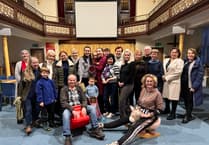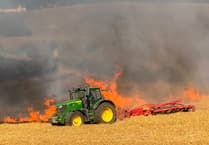I WAS walking past Crediton Methodist Church the other day and the word “TRUST” leapt out at me from the notice board.
It got me thinking: who or what do we trust? Who or what do we not trust in this era of fake news and scam phone calls? Where do we put our trust?
Like me, you may have watched the writer and broadcaster, Simon Reeve’s latest series on Scandinavia.
I was interested in his theory that one of the reasons why Nordic societies have a reputation for happiness and contentment is that there appears to be a higher level of trust - in government and institutions, than is our experience in this country.
Here, rightly or wrongly, there is often a lack of trust - in politicians, for example, in the police, in the NHS.
Especially in the current climate of volatile world politics, do most of us really trust international leaders to make the right decisions? So, where do we put our trust?
The 14th century mystic, Julian of Norwich had a saying: “All shall be well and all manner of things shall be well”.
In one of her visions, she saw a tiny hazelnut and wondered how such a small and fragile thing could possibly survive.
The answer came to her that it existed because God made it and God loved it. To her, the hazelnut represented the world.
Given that 14th century life must have been just as precarious as ours is now, how might that speak to us of trust?
If we believe, as Christians do, that God made our world and has invested huge amounts of love and care in sustaining it, even sending his own son to die for it, we can maybe begin to trust that all his efforts will not ultimately be in vain, however much human beings mess things up.
Of course, that doesn’t mean that we all sit back and do nothing.
The fact that God cares so much for his world may actually spur us on to do all we can to work for peace and justice as much as is in our power. But what about matters that are beyond our control?
Surely, that’s where prayer comes in. But then we ask how much each of us is able to trust the God to whom we’re praying.
The 20th century theologian Henri Nouwen spent the last period of his life living with a circus troupe.
He learned a great deal about trust from the flying trapeze act, comprising flyer and catcher.
Apparently, the flyer must learn not to struggle to grasp hold of the catcher. If he or she does, bones could be broken.
The catch is entirely the catcher’s responsibility. All the flyer has to do is to take that leap of faith and trust that he or she will be caught.
Have we enough of that kind of trust to put our whole lives and the world’s troubles in God’s hands?
Sue Martin
Crediton Congregational Church





Comments
This article has no comments yet. Be the first to leave a comment.